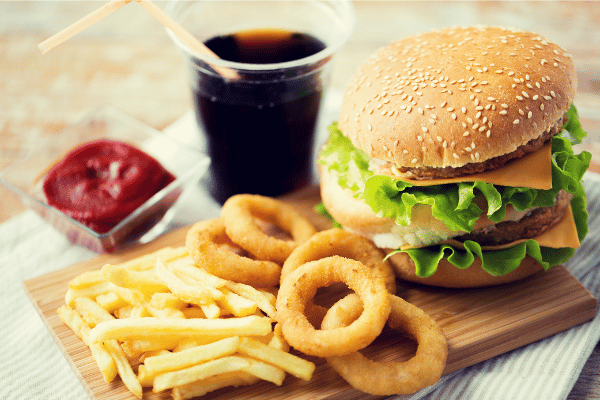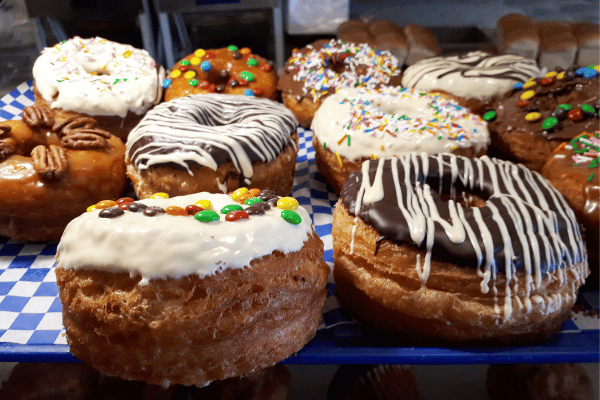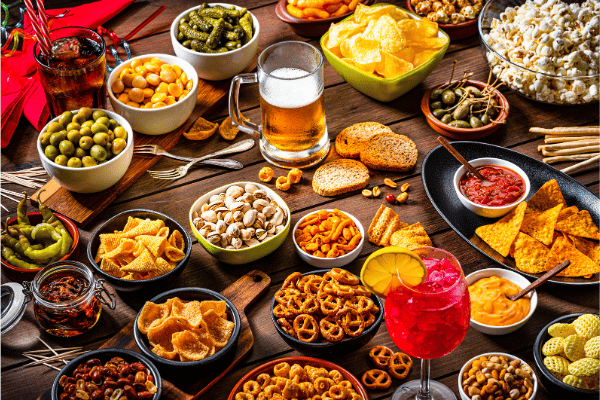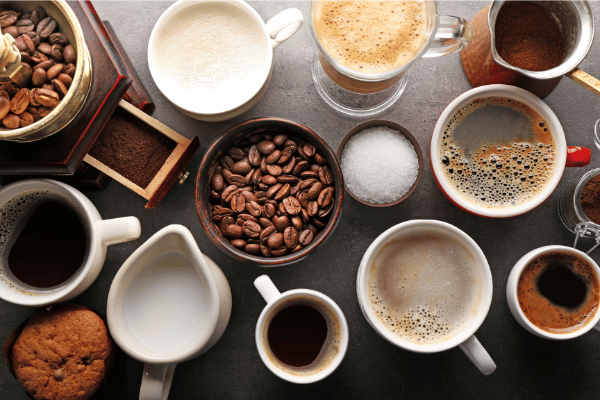Table of Contents
During Ramadan, you should avoid fried and fatty foods, sugary sweets, processed snacks and drinks, caffeine, and salty processed foods. The focus should be on simple, nutritious healthy meals.
Ramadan is a blessed month filled with spiritual renewal, good deeds, and coming together with family and community. However, one aspect that can be challenging is adjusting your eating habits during the fasting hours. I made a list of what cannot be eaten during Ramadan.
To make sure you stay energized and healthy throughout this holy month, there are certain foods you’ll want to limit or avoid completely when breaking your fast at iftar and having the pre-dawn suhoor meal. Let’s go over some food that cannot be eaten during this period.
KEY TAKEAWAY
- Foods to avoid or limit during Ramadan: Fried and fatty foods, sugary sweets and desserts, processed snacks and drinks, caffeine, and salty/processed foods. These can cause issues like weight gain, sluggishness, dehydration, and digestive problems when consumed after fasting.
- Tips for healthy fasting: Stay hydrated by drinking water and eating water-rich foods, fill up on fiber from fruits/veggies/whole grains, prioritize protein to maintain energy, choose complex carbs over simple refined carbs, don’t overeat after breaking the fast, and get enough sleep.
- Focus on simple, nutritious meals: The emphasis during Ramadan should be on fresh, wholesome foods that provide nourishment and sustenance while avoiding unhealthy ingredients like excessive fat, sugar, salt, and artificial additives found in processed foods.
What Foods Are Prohibited During Ramadan?
Fried and Fatty Foods
This one is tough because let’s face it – fried foods just taste so good! But try to avoid fried foods like samosas, fries, and fried snacks as much as possible. These foods are loaded with unhealthy fats and tons of calories that can weigh you down after a long day of fasting.
They can also cause digestive issues like heartburn and indigestion when your stomach isn’t used to dealing with heavy, greasy foods after going so many hours without eating.
Sugary Sweets and Desserts
These desserts are packed with refined sugar with very little nutritional value. Having too many of these sugary desserts can lead to weight gain, disrupted blood sugar levels, and just feeling generally sluggish. If you have a sweet tooth, try to satisfy it with fresh fruit, small pieces of dark chocolate, or just a bite or two of your favorite healthy dessert.
Processed Snacks and Drinks
I’m talking about things like chips, candy, cookies, and sugar-sweetened beverages like soda. Ultimately, these empty calories will leave you feeling unsatisfied and lethargic. They provide no real sustenance to get you through those long fasting hours.
Instead of eating these junky snacks, go for nuts, seeds, fresh veggies with hummus, or other more nutritious options. And replace soda with water, unsweetened teas, or fresh fruit juices.
Caffeine
Speaking of beverages, you may want to go easy on caffeinated drinks like coffee, certain teas, and energy drinks – especially when consuming them right before or during the suhoor meal.
Caffeine can act as a diuretic, causing you to lose more fluids and electrolytes that you need during the fasting hours. It can also disrupt your sleep if you take it too close to bedtime after suhoor. If you do need a caffeine boost, have it in moderation and be sure to drink plenty of water.
Salty and Processed Foods
Because of their high sodium content, such as chips, salted nuts, pickles, olives, and other salty snacks can make you extremely thirsty during the fasting period. They can also cause water retention and bloating.
The same goes for highly processed frozen meals, canned soups and meat and other convenience foods that tend to be very high in sodium. When breaking your fast, go for freshly prepared foods and be mindful of added salt.
So those are some of the foods to limit or avoid entirely during Ramadan to stay energized, hydrated, and feeling your best. But what should you eat? Let’s go over some smart tips.
Tips for Healthy Fasting During Ramadan
Stay Hydrated
This is a major principle. Proper hydration is crucial when fasting, especially if Ramadan falls during the hotter months. At suhoor, have a glass or two of water, and then make sure you drink water frequently after breaking your fast at iftar until going to bed. You can get bonus hydration from water-rich foods like watermelon, cucumber, tomatoes, and soups. Coconut water is another great option for replenishing electrolytes.
Fill Up on Fiber
To help you feel full for longer periods during the fasting hours, load up on high-fiber foods like fruits, veggies, lentils, beans, and whole grains. Some excellent suhoor choices are dishes like oatmeal with fruit, whole wheat toast with egg, or beans. For iftar, start with a big, fresh salad and be sure to include plenty of fiber-rich sides like roasted veggies, chickpea salads, lentil soups, etc.
Prioritize Protein
Protein-rich foods are key for maintaining your energy levels and avoiding excessive feeling of hunger. At suhoor, have foods like eggs, Greek yogurt, nut butters, or lean protein like chicken or turkey. For iftar, enjoy protein-packed dishes made with lean meats, fish, tofu, beans, or lentils. Protein-rich snacks like a handful of nuts, hummus, or low-fat cheese can help tide you over between meals as well.
Choose Complex Carbs Simple, refined carbs like white bread, pastries, and baked goods will cause your blood sugar to spike and then crash, leaving you feeling tired and hungry again soon after. Instead, use complex carb sources like whole grains, fruits, starchy veggies, and legumes. Things like oats, quinoa, whole wheat bread, potatoes, corn, and lentils will provide a steady stream of energy during your fasts.
Don’t Overdo
After going so many hours without food, it’s tempting to want to stuff yourself at iftar. But try to be mindful of your portions to avoid overeating and digestive discomfort. Start your meal by breaking your fast with a couple of dates and a glass of water or milk, as is traditional. Then take your time and stop eating when you start to feel full. Going for a short walk after iftar can also aid digestion.
Get Good Sleep
With the long fasting hours and changes to your routine, Ramadan can really throw your sleep schedule out of whack. But being well-rested is so important for having enough energy to power through the day. Be sure to get 7-9 hours of quality sleep each night. If you have a hard time falling asleep after your post-iftar meal, you may want to eat your last food or snack 2-3 hours before bedtime.
Stay Active While you’ll likely need to scale back the duration and intensity, you don’t need to do too much physical activity during Ramadan. Getting in some light to moderate exercise like walking, swimming, or yoga can help boost your energy levels and aid digestion. Just be sure to listen to your body and don’t overexert yourself. And drink plenty of water when you’re not fasting.
For adults, you’ll want to aim for 3-4 liters of water per day during Ramadan. Now, that may sound like a ton, but remember that you get about 40% of your fluids from the foods you eat, as well as beverages like fruit juice, tea, etc. Even so, you should still strive to drink 1.5-2.5 liters of just pure water from iftar to suhoor.
You could have a bottle of water ready at iftar and take sips in between bites. Then, set a goal of finishing 2-3 glasses of water every hour until suhoor. Keeping a reusable water bottle with you can help you stay on track. And don’t forget that hydrating foods like watermelon, cucumber, tomatoes and soups can also contribute to your fluid intake.
Here are some of the foods to limit and the healthy habits that can help you have an energized, feel-good experience while practicing this sacred tradition. Wishing you a blessed Ramadan filled with peace, connection, and personal growth!







